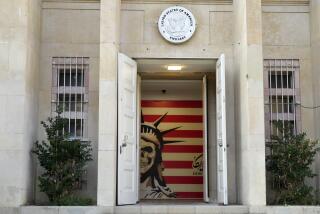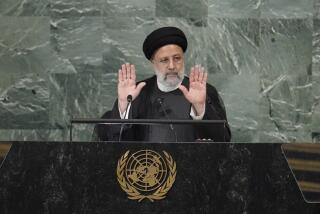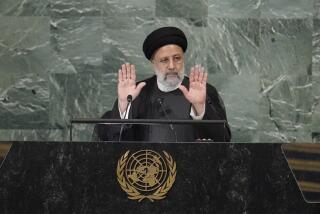Iran’s President Rules Out U.S. Diplomatic Ties
- Share via
NICOSIA, Cyprus — Iranian President Hashemi Rafsanjani said Sunday that Iran wants good relations with all countries but he ruled out resumption of diplomatic ties with Washington.
“Iran is not thinking about establishing ties with the U.S.,” Rafsanjani said at a seminar at Tehran University. “The U.S. is always trying to make the issue of establishing ties with Iran subject to conditions.”
Washington cut ties with Iran after radicals seized the U.S. Embassy in Tehran in November, 1979, and held 52 American hostages for 444 days.
Iran’s relations with the West improved after the Gulf War in which it remained neutral, despite Tehran’s opposition to the presence of U.S.-led Western troops in the Middle East.
Since then, Rafsanjani has walked a political tightrope between courting the West to attract much-needed economic support and appeasing fundamentalists loyal to the hard-line stand against the West of the late spiritual leader, the Ayatollah Ruhollah Khomeini.
“The principle is to have relations (with other countries), but the United States has its own special case, and Israel is illegitimate in our view,” Rafsanjani said.
Ties with the West are affected by the issue of 11 Western hostages, six of them Americans, believed held by pro-Iranian groups in Lebanon.
“They (the Americans) know that they themselves are terrorists, and the Lebanese Falangists who are holding our hostages are their agents,” said Rafsanjani, referring to four Iranians seized at a Christian militia checkpoint in 1982 in Lebanon.
Rafsanjani said no one could prove any link between Iran and those holding the Western hostages, who also include two Britons, two Germans and an Italian.
The Islamic Republic News Agency said the Iranian president expressed opposition to havens for refugees set up by the allies in northern Iraq.
“The Americans have ill intentions, and we are concerned about that. If the plan is extended to the Iranian borders, we will reject it and prevent it.”
Although Rafsanjani spoke harshly about the United States, he said Iran values its relations with Britain. He has been seeking financial and technical aid and has been working to improve Iran’s relations with foreign countries.
Rafsanjani also accused the United States of putting pressure on the United Nations to stall payment by Iraq of reparations to Iran from the 1980-88 Iran-Iraq War.
The United States also drew criticism from Khomeini’s son.
Ahmad Khomeini said allied-run refugee camps in Iraq are intended “to partition Iraq while there are still 2 million other refugees living away from their homes.”
Khomeini, a leading radical, blamed the United States for the Iraqi crackdown on Kurdish and Shiite Muslim rebels after the Gulf War.
More to Read
Sign up for Essential California
The most important California stories and recommendations in your inbox every morning.
You may occasionally receive promotional content from the Los Angeles Times.










